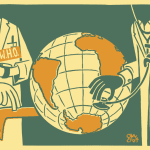Nicholas Barber gets Sherlock just right. Benedict Cumberbatch has the intensity to kill the title role, and, puppyish though he is, Martin Freeman’s Dr. Watson is a credible sidekick. The production is slick, the characters compelling, the rapport sharp and often witty. It’s hugely entertaining.
Then they go and turn it into a soap opera.
Barber: “There were an exciting few minutes during this week’s episode of the BBC’s ‘Sherlock’ when it looked as if Sherlock Holmes was getting on with the job of being a detective. A client had come to 221B Baker Street with a mystery to be solved; Sherlock had deduced – well, guessed – that an entrepreneur named Culverton Smith (Toby Jones) was a serial killer; and he had devised an enjoyably ridiculous scheme to prove his suspicions.”
Alas: “the writers performed one of their trademark rug-pulls. In the end, we learnt that Holmes’s main motivation for taking on the case was to shake Dr Watson (Martin Freeman) out of his depression. Then we learnt that it was Holmes’s long-lost sister (Sian Brooke) who had put him on the trail of Culverton Smith to begin with. The upshot was that the serial killing was more or less forgotten. Ultimately, the episode wasn’t about anything except Holmes and his closest friends and relatives.”
The plotting, already Swiss-cheesy with holes, suffers. The episodes in the fourth season seem interminable. They can’t land these things because catching the criminal isn’t what the story is about. Embedded in a family drama, the crime story doesn’t give shape to the episodes.
It’s not just Sherlock. Adventure stories are getting smaller and cozier, soap operas dressed up with Daleks and Q and Treadstone: “when the Bourne franchise returned last year with ‘Jason Bourne,’ its amnesiac hero discovered that he wasn’t just a soldier who had enrolled in the CIA’s shadowy Operation Treadstone: he was the son of the man who had created Treadstone in the first place. Again and again, sprawling conflicts are being reduced to family feuds.”
Barber finds the trend a disquieting signal of the trajectory of our culture: “The new spate of universe-shrinking, of plots driven by personal animus, could well be a sign of how narcissistic our culture has become, and how desperate film and television studios are to please fans who are obsessed by their favourite characters. But it’s also a symptom of globalisation: now that studios are so reliant on overseas sales, they don’t want to risk offending foreign markets. It’s safer to be personal than political.”
And it diminishes the characters and their stories: “one measure of heroism is to put your life on the line for a cause which doesn’t affect you personally. Fighting for or against your own family is all very well—but I’d expect better of Sherlock Holmes.”















